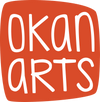By Patricia Belyea
TIETON WA This is a Big Story about a small town in southwest Washington state called Tieton — home to 1,500 residents and a thriving artisan community. But it wasn’t always this way.
Twenty years ago, Ed Marquand cycled into a nearly deserted downtown Tieton. After a whirl around the town, Ed discovered 18 goathead thorns embedded in his tires. With just one replacement tube and enough patches, Ed managed to fix his bike and continue on his way.


Fast forward to today, when I visited Ed in Tieton. The town’s vibrant signage and huge apple crate labels crafted from sophisticated mosaics set a colorful scene.



My first stop was Boxx Gallery, featuring an exhibit called “Art in Stitch” by Linda Riesterer and Geraldine Warner — two fiber artists from Wenatchee. The gallery also serves as a community gathering space and offers an artist residency program with on-site living and workspaces.


Ed and I picked up take-out lunches from Don Mateo across the street and enjoyed our Mexican/Salvadoran cuisine in the garden behind Ed’s office, just two blocks away.

During his 40 years in the publishing industry, Ed founded Marquand Books, specializing in art books for museums, galleries, and artists worldwide.
Ed’s expansive storefront office in Tieton revealed his love of beautiful things with its collections of art, objects, and books.

Today, Ed leads Paper Hammer Studio, an artisan facility housed in the same building as his office. Paper Hammer crafts handmade books, journals, and unique art pieces.


Talented Maria oversees projects at Paper Hammer.

Next door a cafe serves coffee drinks and sells Paper Hammer wares. Though Wallflower Social was closed during my visit, Ed graciously opened it up so I could look around.



Dinner took place at Ed’s Tieton home, located in a converted low-rise warehouse at the heart of town. This building now hosts 14 loft condos with a picture-perfect garden and orchard in the rear.


Had it been a Wednesday, Thursday, Friday, or Saturday night, we could have dined at Nomad Kitchen, renowned for its upscale casual fare.

Following our home cooked chicken dinner finished with slices of fresh papaya, Ed’s tour of the town continued. Our next stop was the Mighty Tieton warehouse bustling with inventive enterprises.


Some of the spaces in the enormous warehouse were empty—ready to be activated by weddings, Day of the Dead celebrations, holiday craft fairs, and other special events.

Down a hallway was an intriguing business. Tieton Mosaic produces striking flat-glass mosaics for wayfinding systems, public art, and architectural installations. That night I saw 27 mosaics, each 12 feet wide by 6 feet tall, crated and ready for shipment to a public transit station in Redmond, WA.

The next highlight was the gallery space of sound artist Trimpin. Ed explained that Trimpin grew up near the Black Forest of Germany where cuckoo clocks inspired his mechanized musical inventions.

Ed demonstrated some of Trimpin’s installations via Bluetooth:
-Klompen, made with Dutch wooden shoes suspended from the ceiling, created a soft clacking composition with the hammering of tiny mallets in the toes. (There is a 120-wooden-shoe version in the collection of Nora Eccles Harrison Museum Art at Utah State University.)

-Nancarrow Percussion Orchestra, with salaged and reconfigured instruments, played an ethereal drum sequence.

Ed explained that another business uses the warehouse as its manufacturing facility — Tieton Cabin Company. Founded by a husband/wife team in 2022, TCC makes design-forward, prefabricated cabins.
I spent the night at El Nido Cabins, a cluster of six cozy cabins offering bedrooms, kitchenettes, living areas, and bathrooms — a short walk from Ed’s condo.
The next day, I began my journey home. I followed Ed’s recommendation to drive north on Highway 821, tracing the scenic Yakima River through its winding canyon.

Reflecting on everything I experienced in Tieton, I was inspired by its commitment to being both mighty and small. I look forward to finding ways to engage with Tieton in the future!

EDITOR’S NOTE When the post was shared with Ed to check for changes or corrections, he responded: You make me look better than I deserve. I’d like to acknowledge the friendships and local support we received from the beginning.
ABOUT US: Okan Arts, a petite family business, is co-owned by mother-daughter duo Patricia Belyea and Victoria Stone. Patricia and Victoria sell Japanese textiles online, host creative quilting experiences, and lead quilting & textile tours to Japan.
FOLLOW OKAN ARTS ON INSTAGRAM @okanarts








